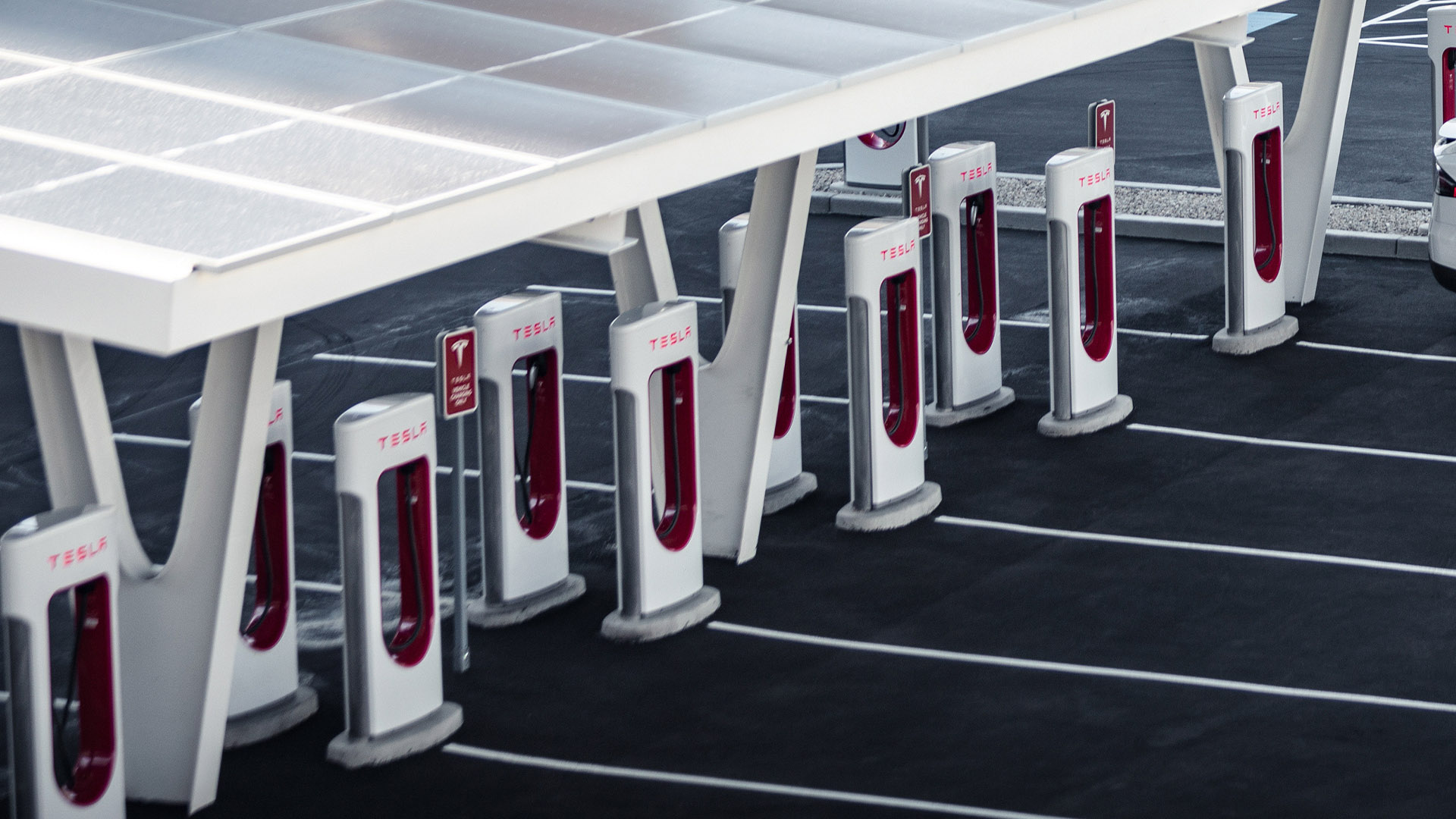

We may earn revenue from the products available on this page and participate in affiliate programs. Learn more ›
EV adoption has been chaotic, to say the least. There are different battery types, chemical compositions, charge rates and mileage, and variations of a bunch of other parts across manufacturers. But one of the biggest issues in differences between EVs of this new era is physically charging the car itself.
Automotive manufacturers have experimented with a host of plug styles—including Nissan’s not-so-great CHAdeMO charger—but the plug types have now been whittled down to Tesla’s North American Charging Standard (NACS) and a more broadly adopted Combined Charging System (CCS). Yet, that too is now changing.
After the last few years of early adopters suffering at the hands of a non-regulated landscape of CCS public chargers that don’t work or fail to operate properly, and listening to those customers’ complaints, automakers are now switching to Tesla’s NACS standard. Why? Well, because Tesla’s more ubiquitous Supercharger network actually works more often than not and it spans most main corridors in the United States and abroad.

It’s not without its own limitations, though. Supercharger stations still aren’t as common as gas stations. But with these deals, the network is set to expand in order to handle the increased use from outside of Tesla’s own fleet.
To help you understand where automakers sit in the NACS vs CCS charging war, we’ve put together a list of every automaker that uses—or will use in the next few years—Tesla’s NACS plug. We’ll be updating this list as it increases.
This adoption is still new, though, and it represents a switch that won’t happen overnight. There are adapters you’ll be able to purchase soon to make your CCS plug functional when using a NACS charger, but you’ll have to check with your car’s manufacturer to check when you’ll be able to start using Tesla’s Supercharger network.
NACS Users
Tesla
Obviously, Tesla isn’t going to switch to CCS now that everyone else is switching to NACS. Plus, the company developed the technology and it will continue using NACS.
Ford
Ford was the first automaker to make the switch from CCS to NACS. According to Ford, the Blue Oval will fully adopt the NACS plug for all of its EVs by 2025, with an adapter available to older EV chargers soon.
General Motors (GM)
GM will also adopt the NACS standard, and follow Ford’s lead by switching the physical plug in all of its new EVs by 2025. The company also stated a plug adapter will become available by Spring 2024.
Rivian
Rivian was an odd one to adopt NACS, as other EV automakers tend to want to stick with the CCS option for a variety of reasons. However, given Rivian’s teething problems, it does make sense that the company wants to reduce as much customer strife as possible to entice new ones. Rivian will adopt NACS by 2025, but be able to access the Supercharger network by 2024.
Volvo
Volvo’s the latest automaker to adopt the NACS plug, though it’s unclear whether or not its other Geely-backed brethren will also choose NACS over CCS. It will adopt NACS by 2025.
Polestar
Volvo’s cousin, Polestar, has also stated that it will adopt NACS by 2025.
Mercedes-Benz
As of July 7th, Mercedes-Benz stated that it too will make the switch to Tesla’s NACS charger. According to the German brand, it will have Tesla Supercharger access starting in 2024 before adopting the NACS plug in all of its EVs by 2025.
Nissan
According to a July 2023 announcement, Nissan will begin offering EVs for the U.S. and Canadian markets with a NACS port starting in 2025. “From 2024, Nissan will make available a NACS charging adapter for Ariya models which are currently equipped with the Combined Charging System 1 (CCS1) for DC fast charging. This will enable customers to connect their vehicle’s charging port to NACS plugs at compatible chargers,” the automaker stated in a press release.
Honda
As of September 7, 2023, Honda stated that not only will it be adopting NACS, but that “In 2025, Honda is planning to launch a new EV model in North America equipped with a NACS port. From that point forward, Honda will continue adopting NACS standards for its models.”
It’s also noteworthy that Honda joined a number of other automakers in coming together to produce and distribute more fast-charging stations across the United States.
Maybe
Here are all the rumblings and rumors we’ve heard.
Hyundai/Kia
At an investor presentation, Hyundai stated that it’s looking into the feasibility of adopting Tesla’s NACS plug. We’ll see.
Others
These aren’t auto manufacturers, but they represent big parts of the industry.
ChargePoint
A separate charging company that both offers home and business charging solutions, ChargePoint was originally part of the CCS bandwagon. It’s now switching to NACS and will start offering NACS plugs on its offerings by the end of 2023.
Electrify America
Like ChargePoint, Electrify America is a separate charging entity that runs and operates a host of public and private chargers across the country. Outside of Tesla, it’s the largest EV charging company. As of June 29, it too said the company would be adopting Tesla’s NACS charger across its 850 charging stations (4,000 chargers) by 2025.
SAE
The Society of Automotive Engineers (SAE) International will now adopt NACS as the standard charging plug, too. According to SAE International, “The standardization process is the next step to establish a consensus-based approach for maintaining NACS and validating its ability to meet performance and interoperability criteria.”
